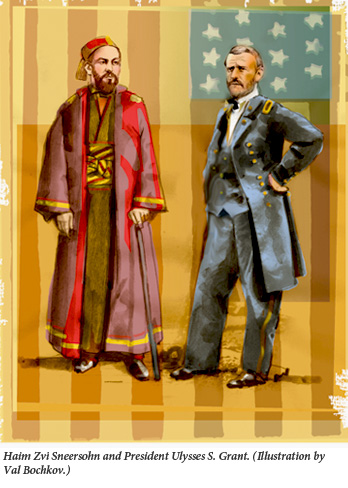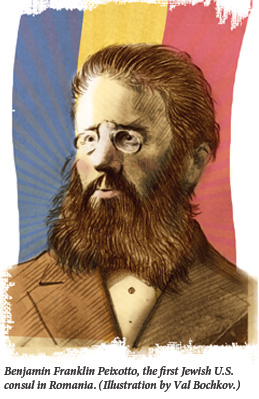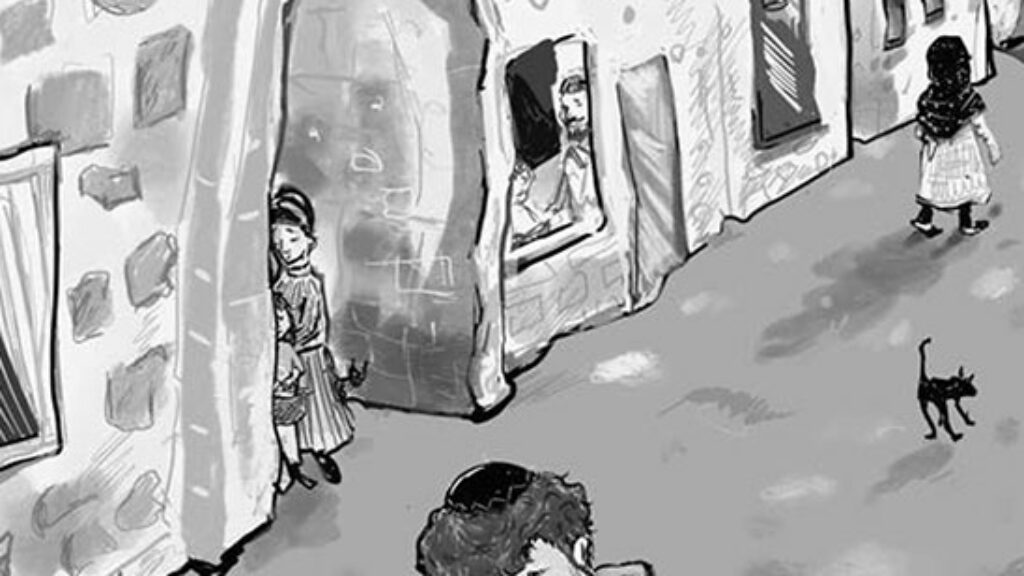President Grant and the Chabadnik
On April 20, 1869, President Ulysses S. Grant held an informal reception on the grounds of the White House. Almost seven weeks had passed since his inauguration, and the hero of the Civil War was now seated in his presidential chair, greeting well-wishers and entertaining callers. Suddenly, an exotic-looking rabbi appeared on the scene seeking an immediate audience with the nation’s leader. Bedecked in what The New York Times described as an “Oriental costume” consisting of a “rich robe of silk, a white damask surplice, a fez, and a splendid Persian shawl fastened about his waist,” he strode self-confidently toward the president. Grant instinctively rose to greet him.
 The rabbi’s name was Haim Zvi Sneersohn, and a few weeks earlier he had arrived in the United States from the Land of Israel ostensibly to raise funds and publicize his views on the coming of the messiah. Sneersohn was the great-grandson of Schneur Zalman of Liadi, the revered founder of the Hasidic movement today known as Chabad-Lubavitch. He was also the grandson of that family’s most notorious black sheep, the founder’s emotionally troubled son Moshe, who to the movement’s great embarrassment had converted to Christianity in 1820. Perhaps to escape the stigma of what was then seen as the ultimate form of religious betrayal, Haim’s parents moved the young boy, his siblings, and grandmother from Russia to the Land of Israel in 1843 or 1844 to begin a new life.
The rabbi’s name was Haim Zvi Sneersohn, and a few weeks earlier he had arrived in the United States from the Land of Israel ostensibly to raise funds and publicize his views on the coming of the messiah. Sneersohn was the great-grandson of Schneur Zalman of Liadi, the revered founder of the Hasidic movement today known as Chabad-Lubavitch. He was also the grandson of that family’s most notorious black sheep, the founder’s emotionally troubled son Moshe, who to the movement’s great embarrassment had converted to Christianity in 1820. Perhaps to escape the stigma of what was then seen as the ultimate form of religious betrayal, Haim’s parents moved the young boy, his siblings, and grandmother from Russia to the Land of Israel in 1843 or 1844 to begin a new life.
By 1869, the 35-year-old Sneersohn had spent the better part of his life as a meshulakh, or emissary, for Chabad and for Jewish philanthropic institutions in the Holy Land. He raised money, among other things, for the shelters for the needy (Batei Machase), which would later house Yeshivat HaKotel in Jerusalem. He also bestirred the faithful to prepare for the coming of the messiah. “The finger of God,” he announced to audiences, “points out to us that the day is not far distant when the grand deliverance will take place.” As an itinerant fundraiser, Sneersohn had already carried his message across much of the Jewish world, including Russia, Egypt, Persia, Australia, England, and Romania. He had achieved renown as a polyglot and able public speaker. Wherever he traveled, Jews and non-Jews turned out to hear him. That proved true in the United States as well.
Before meeting Grant, Sneersohn had lectured twice in Washington, D.C. concerning Jews in the Holy Land. A local correspondent writing in the European Hebrew-language newspaper Ha-magid reported that his audience was “large and appreciative” and included such notables as the Turkish ambassador, members of the president’s own family, local clergy, and several congressmen. “His eloquence and fluency in the English language were generally admired,” the fawning correspondent wrote, “and his words made a good impression upon the audience.”
Sneersohn, however, had not just come to Washington to make a good impression and spread his religious message. He also carried out a secret political mission undertaken on behalf of the Jewish community of Jerusalem. That mission had already brought him to the State Department, where he had a long discussion with Secretary of State Hamilton Fish. Now it brought him face to face with the president of the United States.
“Permit me to give my thanks to the Almighty, whose mercy brought me here,” Sneersohn began. Without waiting for a reply, he pronounced the traditional blessing that Jews make upon seeing a monarch or head of state: “Blessed be the Lord, who imparted from His wisdom and from his honor to a mortal.” Following a florid display of praise for Grant and the United States, he closed in on his subject: “to advocate the cause of his oppressed brethren in the Holy Land.” He requested the appointment of a Jew to the staff of the American consulate in Jerusalem. He sought permission for Jewish residents, during times of violence, “to seek refuge under the Stars and Stripes.” Most importantly, he called upon Grant to dismiss the American consul in Jerusalem, Victor Beauboucher, so “that the principles of the Government may be truly embodied in its representative abroad.” If Grant moved favorably on all his requests, he intimated—implying that as a rabbi and resident of Jerusalem he possessed extraordinary spiritual powers—”this free country and its exalted chief should be blessed on the sacred spot of our common ancestors.”
Grant was sensitive concerning all matters Jewish. Back in 1862, he had expelled “Jews as a class” from his war zone, an order that Abraham Lincoln had overturned. Grant belatedly apologized for the order following his 1868 election, and now Sneersohn gave him the chance to prove that apology genuine.
Sneersohn’s main objective was to remove Consul Beauboucher. A Frenchman, Beauboucher was the first and only American consul at Jerusalem who was not a United States citizen. He had received his consulship in reward for services rendered to the Union army during the bloody Battle of Coal Harbor in 1864, in which he fought and suffered a shattered leg. In his memoirs, Grant accepted responsibility for the terrible losses sustained in that ill-advised assault on Robert E. Lee’s fortifications near Richmond. “I have always regretted,” he wrote, “that the last assault at Cold Harbor was ever made . . . No advantage whatever was gained to compensate for the heavy loss we sustained.” The State Department’s appointment of Beauboucher to Jerusalem, in 1865, was a form of restitution.
Sneersohn and the Jews of Jerusalem may not fully have understood that, but they did quickly discover how ill-equipped Beauboucher was for his position. He particularly infuriated Jews when he utilized the power of his office to assist Protestant missionaries in a heavy-handed but ultimately unsuccessful effort to convert a young Jewish orphan named Sarah Steinberg to Christianity. The consul’s home guards had broken into the home of the rabbi suspected of harboring Steinberg, destroyed his household goods, and carted him off to jail. The whole incident was labeled an “abomination” by Jewish newspapers and led to demands for the consul’s removal. As a self-styled representative of the Jewish community of the Holy Land, Sneersohn hoped to use his charm and media savvy to wreak revenge on Beauboucher and to promote both the Jewish community’s interests and his own.
What Ulysses S. Grant made of the scene unfolding before him is difficult to say. The correspondent of Washington’s National Intelligencer felt that he had been “deeply moved by the rabbi’s sincere and feeling words.” The modern-day editor of the Ulysses S. Grant papers considered the meeting with Sneersohn important enough to list in his “Ulysses S. Grant Chronology.” But Grant himself, in typically laconic fashion, simply asked a few questions and declared, “I shall look into this matter with care.” That was enough to earn him a “fervent prayer” from Rabbi Sneersohn, a universalistic twist on the traditional prayer for the government recited in many synagogues to this day: “May the Supreme King of Kings grant you a long life, and inspire you with benevolence and friendship toward all mankind.” Grant, who usually kept his religious feelings to himself, responded gratefully. “I thank you,” he said, “for your wishes and prayers.”
Onlookers believed that Sneersohn would succeed in his mission. “The American Government,” the National Intelligencer predicted, “can not refuse so humble a request . . . [T]he Israelites . . . shall have in the American consulate at Jerusalem an advocate.” Unbeknownst to Sneersohn, Beauboucher was ailing and eager to leave Jerusalem. He had already written to Grant requesting transfer to Italy, Spain, or Germany. By 1870, he was gone. Sneersohn took credit for the removal, but it was probably preordained.
Having accomplished his mission and become something of a media sensation, Sneersohn proceeded across the United States, lecturing and speaking to journalists wherever he went. Like a 19th-century Shmuley Boteach, he craved publicity. When Judge Bellamy Storer of Cincinnati described him as “destined in the Providence of God to be a minister and a messenger . . . to the world,” he publicized the testimonial. When Mormon leader Brigham Young invited him to address the citizens of Salt Lake City in the Mormon Tabernacle “on subjects of such deep and abiding interest to us all as the past history and present condition of God’s covenant people Israel,” he publicized that letter too.
The issue that ultimately brought Sneersohn back onto the national stage, however, was Romania. With its Jews in trouble, he came up with a plan to help them. The condition of Romania’s Jews had been worsening since 1866, when a new conservative government took power that legalized anti-Jewish discrimination. It limited where Jews could live, denied them the right to own land, and restricted the kinds of occupations they could hold. A rewritten Romanian constitution stated, unambiguously, that “Romanian citizenship may be acquired by Christians only.” Jews, even when native born, were deemed stateless foreigners. (One minister called them a “social plague.”) The regime forcibly deported hundreds of Jews and encouraged mob violence against thousands of others. One politician openly suggested that the best solution to the problem posed by Jews was to “drown them in the Danube.”
In June 1870, just as Sneersohn arrived in San Francisco, reports reached the United States that “fearful massacres” of Jews were taking place in Romania. The San Francisco Bulletin put the figure of those murdered at “a thousand men, women, and children.” The New York Times, comparing the violence to the infamous St. Bartholomew’s Day massacre of 1572 that had decimated France’s Huguenot population, called upon the United States government to “do all in its power to check the hideous massacre.” Meanwhile, “leading Israelites” from around the country “arouse[d] their representatives in Congress to do all they can,” and similar messages poured into the White House.
Sneersohn, who had travelled through Romania, was naturally distraught, and so was his host, Benjamin Franklin Peixotto. The latter, scion of a distinguished Sephardic family, was a lawyer, journalist, an exceptional orator, a disciple of Senator Stephen A. Douglas, and a well-respected Jewish leader who had been a past president (the official title was “Grand Saar”) of B’nai B’rith. Sneersohn saw in him a kindred spirit and concluded that he might become the instrument of Romanian Jewry’s salvation. Having learned from Beauboucher what an American consul might accomplish abroad, for good and for ill, he concluded that Peixotto should now put his own name forward for the vacant American consulship at Bucharest. Peixotto agreed. “I am ready and willing to go to Bucharest,” he announced in a dramatic letter to Simon Wolf, the recorder of deeds for the District of Columbia and President Grant’s chief advisor on all Jewish matters. Sneersohn’s powers of persuasion had worked their magic.
 Peixotto understood that the consulship carried no salary. He would have to raise whatever funds he needed himself. He also understood that the situation of Romania’s Jews was, in reality, less dire than the sensationalist press had first reported. Much to the embarrassment of American Jewish leaders, reports of large-scale massacres in Romania turned out to be greatly exaggerated. Nonetheless, Romanian Jews continued to suffer significant oppression, and Peixotto, having committed himself to Sneersohn (“my constant companion and counselor”), remained under his spell. “Heaven,” the would-be consul avowed, “hath not placed it in my power to show the extent of the sacrifice I would make for suffering humanity, for persecuted Israel.”
Peixotto understood that the consulship carried no salary. He would have to raise whatever funds he needed himself. He also understood that the situation of Romania’s Jews was, in reality, less dire than the sensationalist press had first reported. Much to the embarrassment of American Jewish leaders, reports of large-scale massacres in Romania turned out to be greatly exaggerated. Nonetheless, Romanian Jews continued to suffer significant oppression, and Peixotto, having committed himself to Sneersohn (“my constant companion and counselor”), remained under his spell. “Heaven,” the would-be consul avowed, “hath not placed it in my power to show the extent of the sacrifice I would make for suffering humanity, for persecuted Israel.”
Earlier, Sneersohn had himself written to Grant—”the chosen Chieftain of the United States of America, warrior, hero and prince of peace”—about Romania. Never wanting in self-confidence, the rabbi urged the appointment of “a Jewish citizen . . . as Consul,” a slap at the State Department’s first choice for the position who, like Beauboucher, was not a citizen. “Such an example of so great and mighty a nation in its appreciation of men and its honor of their rights without regard to religious belief,” he advised the president, “could not fail to make an impression.” Peixotto, who was at once native-born, religiously engaged, and highly accomplished, was in Sneersohn’s view the perfect choice. Although Simon Wolf was unimpressed by “the machinations of Rabbi Sneersohn,” and considered the man “unpredictable and impracticable,” and although Peixotto admitted to not having supported Grant in the 1868 election, Wolf “very reluctantly” sent his name to Grant. Grant obligingly forwarded the name to the Senate and, by unanimous consent, that body approved the nomination on June 29.
Once in Romania, Peixotto, much as Rabbi Sneersohn had anticipated, devoted the bulk of his energies to improving the lot of the local Jews. He strongly advocated for their emancipation and citizenship; promoted education and modernization; created and subsidized a pro-Jewish liberal newspaper; established a Jewish fraternal organization parallel to B’nai B’rith; and, when Jews were attacked in 1872, he rushed to their defense, providing refuge for some of them in his own home. In a private letter, he gave vent to his true feelings about Romania at that time: “The lightning of heaven,” he wrote, “should blast a country so infamous.”
Sneersohn published his account of the Romanian situation that same year, in a book entitled Palestine and Roumania: A Description of the Holy Land and the Past and Present State of Roumania and the Roumanian Jews. A collection of his letters, articles, and speeches, the volume concluded with a vainglorious recitation of his own accomplishments on behalf of Romanian Jewry:
I was the first who applied to the American Government in their behalf . . . I succeeded in persuading my friend Benjamin Peixotto to quit his native shores for the sake of his brethren in Roumania . . . I actually succeeded in arousing the sympathy of the liberal Americans for my suffering brethren in Roumania.
Reminding readers that he was not one of those rabbis “who saw nothing in the world but the four walls of the Beth-Hamedrash,” he concluded with a call for peace, for improvement in the Jewish position in the world, and above all-this 24 years prior to Theodor Herzl’s The Jewish State-for “the great cause of establishing a Jewish independent commonwealth in the land of our forefathers.”
Sneersohn’s Zion-centered solution to the Jewish problem in Romania placed him at odds with Peixotto, who advocated large-scale Romanian Jewish emigration to the United States. For the first time, but not the last, the Promised Land of Israel and the Golden Land of America offered competing options for Jews persecuted in Europe. In response, a disappointed Sneersohn assailed the plan of his former protégé in what has been described as “biblical but ill-tempered invective.”
In his call for a Jewish commonwealth, Sneersohn failed to mention that he had himself taken out American citizenship. But now, for ideological reasons, health reasons, and in hopes of establishing a Jewish agricultural colony, he returned to the Holy Land, settling in Tiberias. During the first seven decades of the 19th century, many Christians had come to the Holy Land to work the land with their own hands. Sir Moses Montefiore of England advocated for these same kinds of productive activities on the part of Jews. Echoing these calls, Sneersohn argued that a successful agricultural colony would encourage Jewish immigration to the Land of Israel and help bring an end to Jewish dependence upon charity.
The Jewish religious establishment in Tiberias vehemently disagreed. They viewed Sneersohn as an interloper and considered his planned colony a threat both to the Tiberian community’s holy traditions and to its settled norms. Religious zealots—then as now part of the fabric of Jewish society in the Land of Israel—soon excommunicated the great-grandson of Schneur Zalman of Liadi and spread scurrilous reports concerning his activities. On November 28, 1874, they set upon him with stones, robbed him of his worldly possessions, stripped him stark naked, tied him to the back of an ass, and paraded him through the streets and outside the city walls. To shocked onlookers, they explained that Sneersohn thought that he was the messiah (who, by legend, is supposed to arrive on a donkey). Sneersohn never fully recovered from this attack. Though he maintained friends in high places and was even able to enlist American diplomats on his behalf, all efforts to retrieve his possessions and bring his persecutors to justice failed.
By 1878, Sneersohn had recovered enough to reunite with Ulysses S. Grant when the latter became the first American ex-president to visit Jerusalem as part of his round-the-world tour. Meeting him at the governor’s house, the rabbi offered Grant yet another heartfelt blessing and lobbied him on behalf of the “committee for distributing relief to American Jewish citizens.” As a newly minted American citizen himself, he had a personal stake in this committee’s success. Grant, however, failed to rise to the bait. He simply promised “to inform some of his friends, leaders of Israel in America, of the facts,” and there is no evidence that he ever did. Nor, in the end, would it have mattered, for by 1882, Sneersohn was dead. He took ill on a trip to the Cape Colony and was buried on South African soil.
In 1973, Israel Klausner published a brief Hebrew language biography of Sneersohn, describing him as one of the early heralds of the modern State of Israel (me-mevasrei medinat yisrael). But his true significance lies elsewhere. In his exotic dress, public displays of piety, florid oratory, unabashed chutzpah, self-interested politics, wide-ranging travels, philanthropic missions, unseemly quarrels, and fervent messianism, Sneersohn introduced Americans to a new, and distinctively modern, rabbinic type.
Comments
You must log in to comment Log In
Suggested Reading
Movies and Monotheism
At age 97, Herman Wouk returns to Moses and goes postmodern.

Lessons of the Soviet Jewish Exodus
Between the mid-1960s and 1991, more than two million Jews left the USSR. To the extent that the Soviet Jewish exodus is remembered, its lessons are misunderstood.

Radical Kindness and Heroic Dogs: A New Anthology of Yiddish Children’s Literature
Honey on the Page, like the best anthologies, is an eye-opening work of literary history, gleefully introducing a sea of lightly known authors through both their work and through meticulously crafted biographical sketches.

Intrigues and Tzuris
Have you seen the one about the Hasidic jewelers and the Albanian goons?
feldmancp
Mr. Sarna's beautifully written article brings Sneersohn to life and I would like to read some more about his incredibly interesting life that was lived making extensive travels at a time when travel was not as quick and easy or as economical as it is today.